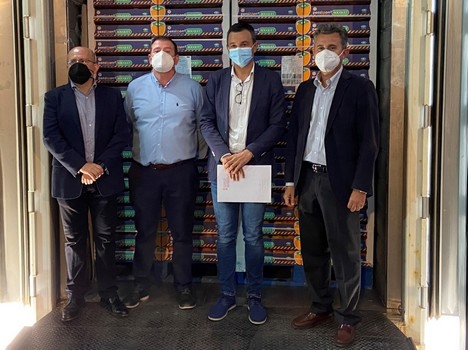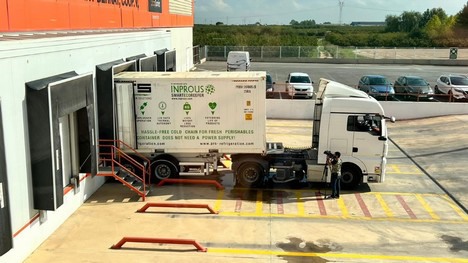About 7,000 kilos of Persimon Bouquet kakis departed recently from Carlet bound to Rungis, Paris, making a stop in Saint Charles, Perpignan.
Eight pallets are making their first trip in a smart passive container featuring the SmartEcoReefer solution developed by the company INPROUS-PRS, which is putting it at the service of the agro-food sector. It is a pilot test in which Anecoop and its partner cooperative, Sant Bernat de Carlet, are taking part with the support of the European project TRAILS.

Current challenges in the logistics sector
Today, the logistics sector faces many challenges in its quest to optimize the transport of perishable goods, especially as regards temperature preservation and energy supply dependence along the journey.
The annual impact of conventional refrigerated containers in import/export operations to and from the European Union to Africa and the Middle East amounts to 600 million tons of CO2 emitted into the atmosphere and a consumption of 1.2 billion kWh, due to the energy consumption of the refrigeration unit.
At the same time, food waste in the EU amounts to 80 million tons, equivalent to 160 kg/person per year, at a cost of 143 billion Euro. This is due to the unreliability of the conventional cold chain, which results in insufficient preservation quality in long-distance transport of highly perishable products.
The objectives of European Trails and SmartEcoReefer
The objective of the SmartEcoReefer solution from INPROUS-PRS is precisely to provide the sector with a comprehensive technological solution that guarantees customers the right services for temperature-controlled logistics.
The objective of the European Trails project is to test long-distance cross-border multimodal transport. It aims to show that this innovation and this new container is suited for the rail transport of fruit and vegetable products in positive cold temperatures and can promote modal shift, save CO2 and help unclog the roads.

The logistics partners of this pilot test organized by members of the TRAILS project and the ANECOOP GROUP are Transportes SALVA, the railway company NOVATRANS, and for the last mile in Paris, Transports MESGUEN.
This type of container seems to have many advantages that will be verified with the pilot test, in real conditions in the cross-border and European area. Some of the most outstanding are:
- Autonomy of the container ranging from 12 to 25 days, depending on the equipment.
- It is passive container, so it is free of mechanical problems.
- Achieves an 81.9% reduction in energy consumption and carbon footprint of the logistics process. If loaded with renewable energies, we are talking about a zero-emission impact.
- It is perfectly adapted to rail use.
- The type of cold it generates limits bacterial or viral proliferation, rotting and ensures greater freshness and product quality.
More than 15,000 trucks cross the Spanish-French border every day, 40% of which are refrigerated trucks carrying products in positive or negative cold temperatures. In other words, this is a strategic sector for the Spanish and French economies (fruit, vegetables, etc.).
At this time, 90% of the volumes of these products are transported by road. The modal shift to rail is complex due to the lack of railway power supply, the discontinuity of the Mediterranean corridor and also the lack of technical means. However, these reefer containers allow agro-food products to be transported safely, reliably and without technical (temperature control, refueling, refrigeration engine repairs) or environmental difficulties. All this was certified by the Institut de Recerca i Tecnologia Agroalimentàries (IRTA) last summer 2020.
The project, designed for the agro-food sector and winner of the recent "Ports 4.0 de Puertos del Estado", has the following technical characteristics:
- Adaptation and application of the proprietary cold technology patented by PRS Technology in multimodal containers of 20, 40 and 45 feet, to be used in a logistics system and in temperature-controlled agro-food distribution, especially in exports with a transit time of between 20 and 25 days. Thanks to the PCM plates, the cold is released little by little, allowing the goods to be kept in positive or negative cold for 12 days or more, depending on the equipment model.
- Research, design, development and application of the latest technological trends related to artificial intelligence (AI), through which the acquisition of new knowledge is expected. Such knowledge is based on the analysis of different scenarios for the modeling of the technical behavior of transport and anomaly detection, big data architectures, Iot to monitor, capture and manage data from sensors and early warning systems to promote predictive management and identify risks during transport.
- Response to unexpected anomalies in near real time, thanks to SmartEcoReefer.
- Application of blockchain technology to the agro-food market to certify the validity of the data generated.
- Design and development of different modules based on interoperable APIs.
- Development of dashboards and other necessary interfaces.
